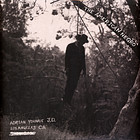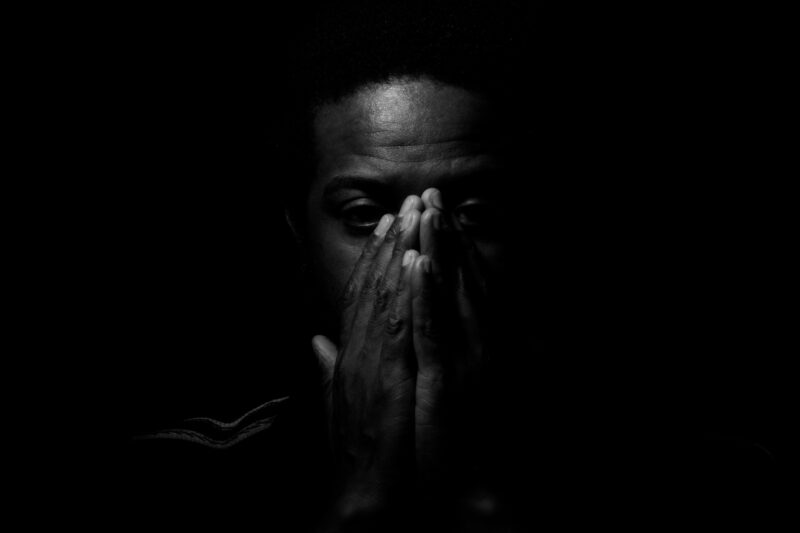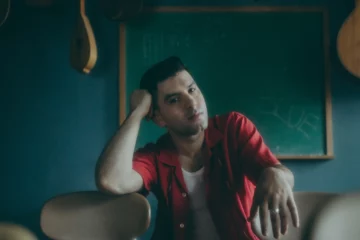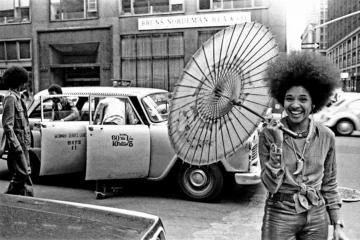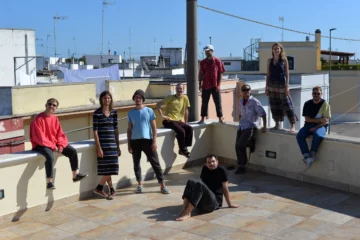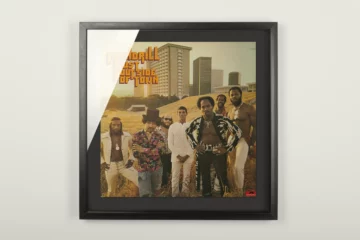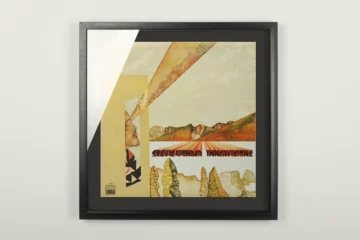He has worked with Ghostface Killah and Kendrick Lamar, written the soundtrack for the Marvel film »Luke Cage« and founded his own label, Jazz is Dead. The US musician Adrian Younge is what one likes to describe as big in business. For his latest album »The American Negro«, he places himself in front of a school class that never existed, but should have. A school class in which questions of justice and the ideology of racism are discussed. In which things are told that shake at the system. And which relies on frontal shock. On the cover of »The American Negro«, Younge dangles from a rope – Facebook has repeatedly deleted the video. »But nobody asked me if I wanted to see a cop kill George Floyd,« Younge says. His album, he explains, is a lecture, a kind of history book, the continuation of Marvin Gaye’s »What’s Going On«. Why you have to process the past from the present, why you should listen to him in the process and why the message is sometimes more important than the music, Adrian Younge told.
Do you consider yourself an artist or activist?
It’s both, but I’d answer this question by giving you a question: Would you consider Marvin Gaye an activist when he put out »What’s going on«?
Ha!
Yeah, I absolutely consider myself an activist because the main reason I put »The American Negro« together was to teach people, first and foremost, about the inequities that are still haunting us. I wanted to contextualize why we are still facing so much bigotry and discrimination around the world, because racism is different internationally. Every nation has its own problems, but these problems that are derivative from racism really all have been derived from slavery. Slavery came before widespread racism. Before slavery in the western world, there was obviously a stratification that was based on class—you had feudalism and religion doctrines that pit people against each other—but it was not so race-based as it is now. So, with capitalism nations felt it was OK to marginalize those of a darker hue and therefore change custom, laws and perspective on how you treat people based on how they were born. It’s as if you were born a criminal. You’re born without value if you’re darker. While these principles created a large amount of revenue for some, it put others in perpetual bondage. Nowadays, some say that there was no such thing as racism because slavery is not here anymore or the civil rights movement has come. But it’s all over the place! It is just not as brazen as it once was.
It’s more subtle and structural, isn’t it?
We are having a new reckoning on race relations because now we have conversations about the nuances of racism. Before that, there weren’t as many discussions about all the inequities that we face. »The American Negro«, my short-film »TAN« and the podcast »Invisible Blackness« were created to help contextualize our history—the history that has been revised by our nations.
The reason I wanted to ask you whether you consider yourself an artist or activist was because I recognize a shift you made with your latest album. »The American Negro« is different to the work you’ve done so far. It’s more frontal, politically charged, and self-assured.
This is the most important project I’ve ever been a part of. The message is way more important than the music. It’s an indoctrination on America and the world. I read a lot, I’m a truth-seeker, so, when you grow up to realize things like if you have darker skin it’s harder for your parents to raise you because of the obstacles they have to face; when you realize that those of a darker hue are imprisoned longer and more often than others who committed the same crime. When you start putting all of these variables together, you start realizing that there is an enigma, and you start looking who is controlling this enigma. Then, you want people to know that race is a social construct. It’s a fallacy, that there is no real scientific basis of race. We all come from Africa. I can say you’re Black and I can say I’m Black. We are all the same. If I’m saying Black Power to the Asian or Latino community, what I’m really trying to say is: Power to the people. We constantly have to remind ourselves that we are equal. We have to empower by saying these things so that we can all identify as humans. So, first of all it’s about restructuring people’s brains to understand that concept.
What then?
Once you understand that concept you can start to analyze the inequities in the world. You come up with answers and reasons as to why these things are happening. If you then go back into history, you can see why it was brazenly happening back then. You see how the mechanism had been put in place centuries ago are still continuing to displace us because of a protracted commitment by our governments to bring justice. It’s all incrementally happening, but we have to yell in order to be heard. When the George Floyd protest happened, that was the biggest protest in the world. We never had this before …
It spread out into the entire world.
Right, it was beautiful to see people coming together for a common cause, for humanity. It wasn’t a Black thing, it wasn’t a Mexican thing, it was a people thing because people are seeing that those of a darker hue are marginalized, that it’s harder for them to live and that it’s not fair to all of us to see that happen. So, with »The American Negro«, the podcast and film, I want this to all be part of the zeitgeist. I want this to be part of the movement. The sad thing is: I don’t know when the discrimination is ever going to stop—if ever.
»There’s just never been an album that took a professorial stance against social inequalities dealing with race. With »The American Negro« I wanted to do just that.«
Andrian Younge
Probably going back in history and revising it is a fair beginning. I’ve listened to the album as an inventory of the present age with a focus on the past.
I totally agree. The remanence of racism ferments an ideological structure where imagery subjugates the value of Black people. When you see us on TV as criminals; when you see us on movies as feeble-minded people, this becomes our perceived identity. You cannot overlook how important self-esteem and identity is to the way people live. If you can’t believe in yourself why even try? If society is telling you that you’re not good enough because of your color, most normal people can’t jump over that hurdle. They can’t see past how other people see them. There are so many reasons why this institutionalized form of discrimination is so awful. So, why do we just have to face it? I have two daughters, and I have to constantly tell them how special they are. At the same time, I am a son. My mother would tell me how scared she was when I left the house. Just because I’m Black! She didn’t want me to be on the wrong side of the law—and I wasn’t the kid that was always being arrested or getting into trouble. Now, I’m a father. I wear a suit every single day to work. Still, I could be treated the same way as a gangster dressed like a crip or a blood.
I remember the story of how Miles Davis was beaten by the police in front of a jazz club. It was 1959, he had just released »A Kind of Blue« and didn’t do anything wrong. That’s just one incident of police brutality against POC from the past, but it tells how little has changed.
It’s not that nothing has changed in all that time. There were places in the South 50 years ago that were still segregated even though it was not allowed. There were still places where we could not get onto a bus. That doesn’t happen to the same degree anymore, but the question is whether the mentality has changed. Just because you’re not brazenly talking about how racist you may be doesn’t mean that you aren’t still a racist. One thing that I teach on the album is that you can be a good person, but commit racist acts unbeknownst to you. You could just follow custom and tradition, not even realizing that what you are doing is racist. You could be casting judgement on a person just because of their color and not realize that it is racist because it was accepted for you to do this. Now that you have the education, you put on a higher standard. In law we call it the »knew or should have known« standard. If you knew or should have known that your act was wrong, you are culpable of the offense. I’m trying to teach people what racism actually is, so they can look at themselves and see if they commit racist acts.
When you talk about teaching people it determines that people are willing to be taught; that they are open to listen. What makes you believe that people will listen to you?
There are a lot of people who are willing to listen. And there are a lot who don’t want to hear it at all. Those are the people that I deem intransigent—the intransigence of the blind. Their unwillingness to listen or hear any other opinions outside their own, these are the sectarian views. And that’s just what it is because some people are ignorant, but most people are good. That’s the intuitive virtuous perspective I have of people.
What makes you believe that?
In America, we are taught that Abraham Lincoln was a savior for the Black community; that he is the one who freed the enslaved people; and if it was not for Lincoln we may have never been saved. What they don’t teach us is that Abraham Lincoln did not look at Black people as equals. When you look at his speeches, he talks about this—especially when he was speaking in the South. He explicitly referred to us as creatures. Additionally, he was in serious discussions regarding sending Black people back to Africa. So, when he freed the enslaved people in the US, it was just a military move. The North was fighting the South which system and economy was based on slavery. In order to unify the North and South, Lincoln emancipated the enslaved as a military tactic. At the same time, Lincoln did not want Blacks to serve in the war because they were not allowed to have weapons. These are the things that we are not taught in school! When you start teaching people that our constitution was created to protect white land-owning men in America—not women, not people of color—you start to understand what it means to follow the rules of law. Rules that were created by white men to protect themselves. If you know that, you start to understand the connections to how the laws are written today. Because if we’re supposed to follow the rules of law, why should we follow the law at a time when in the 60s Black people could not walk through certain doors. These substances of law are so diametrically opposed to natural law … so, as you see, there are many reasons why education can turn the average person into a listener.
That’s why you talk about the racist past of the US not in metaphors but in straight-forward and way. The music is not the foundation for the words, rather it’s the other way around.
I am a musician for life, but if I could make an album that changes people’s lives because of the context, there isn’t a piece of art more important than that. This is analogous to Marvin Gaye’s »What’s Going On«. I love his other albums, but no other record of him is as important as that based on its egalitarian message to the people. I wanted to have my own version of that—and I wanted to take it to the next level by talking about life and justice from a professorial side instead of just as an artist. I want to break down history and let people use this album as a document that they can use to teach about the vestige of racism.
Hence, the spoken-word interludes between the actual tracks, right?
Absolutely.
In another interview you said that it was important to trick people into listening to the message. In the case of your album, teaching people from a professorial side, this approach doesn’t exactly hold up.
I don’t know which interview you’re referring to, but I never meant tricking people. As a musician I create riddles for people to solve …
The interview was with Vulture.
Do you know exactly what I said there?
In the original quote you say: »When you kind of trick people into listening to the message, you win«.
That could have been in response to something I said regarding the message being more important than the music. I could make music—and I say this humbly—that is beautiful. It’s not that hard. The moment you can tie a message to that music, you’re tricking people into listening to the message. Some people just like my music. They listen to it, not expecting the message, but then they get the message without being asked if they wanted to hear it. That’s what I meant by the perspective of tricking people into it, I think.
«I made an album on human rights, including men and women, to educate people on the fact that some of us are treated the same. If we all come together and realize what is happening, empathy always serves as a fuel for positive results.«
Adrian Younge
It’s kind of nudging people to hear it.
I’ve heard this from people. There was this reporter, a white lady, who told me that at first, she didn’t think that this album was for her, but after listening to it for a few times she started to realize that it was. I made an album on human rights, including men and women, to educate people on the fact that some of us are treated the same. If we all come together and realize what is happening, empathy always serves as a fuel for positive results. Spreading this message of consciousness, we can try to annihilate as much bigotry as possible. If you look at the past, you can see that we’re doing a good job because we are getting better. We’re just not there yet.
*You never must stop educating people.
Absolutely. There is so much that you don’t know about your own country—and there’s even more that you don’t know about other countries because a lot of this isn’t taught in school. For example, if I go to Brazil, there are people who have my same skin color, but they’re not considered Black. Even though they have Black ancestry. If you come to the US though, there has always been this one-drop rule. It means that if you have one percent of Black ancestry, you’re considered Black no matter what. It’s interesting to see how this fallacious concept of race changes the way people are viewed in society. It is arbitrary. Brazilians just call themselves Brazilian, but it is masking the real racism that lies underneath.
That reminds me of the quote James Baldwin once gave: »White is not a color, it’s an attitude whereas Black is a condition.«
James Baldwin was a big influence on me because I love the depth he got into when he was speaking on race relations. Marvin Gaye’s »What’s Going On« talks about it, but it never went as deep as Baldwin did—not meaning that in any condescending way. There’s just never been an album that took a professorial stance against social inequalities dealing with race. With »The American Negro« I wanted to do just that.
Actually, when I first listened to the album, I was seeing the concept of the record through the lens of a law professor which I am not and I know you are. The reason for this, though, was that I had the feeling you collected the evidence and sources of the past in order to bring the present time to court.
I put my case together, right. It was a tough decision because you sacrifice your music for political context, but I had to do it. Otherwise, I would not be able to speak to you about this. And you would not be able to speak to other people about this. Everybody who listens to the album is a little smarter. I don’t even mean that in an arrogant way. There are just things on the album that—before I made the album—even I didn’t know.
It’s a sonic history book, isn’t it?
That’s exactly what it is, thank you. It has to be a tool that I want younger people to listen to growing up and understanding that twelve of the first 18 presidents of the United States were slaveholders. We don’t spend time in elementary school on this over here. But what if we did?
That might be a stupid question to ask, but what would change?
Younger people would become better educated when it comes to social issues dealing with race. Let me give you an example: Because of us having had four years of Trump, a lot of the problems in our society have become evident. It has created a phenomenon of young people doing videos in which they are teaching their parents about their racism. That has never happened before. It’s because young people are educating each other on the concept that Black lives matter. Even though that’s a difficult paradox to understand. »Black Lives Matter« doesn’t argue that Black lives are more important than any others. It’s arguing that Black lives matter just as much as any other lives. When you have children who understand that complicated message, you will have adults who are wired to see and detangle the enigma that has been ensnaring people into falling into racist ideology.
Which probably could be the most fulfilling consequence of the album.
It’s making people realize that there is no such thing as race. The message is: Treat people equally.
